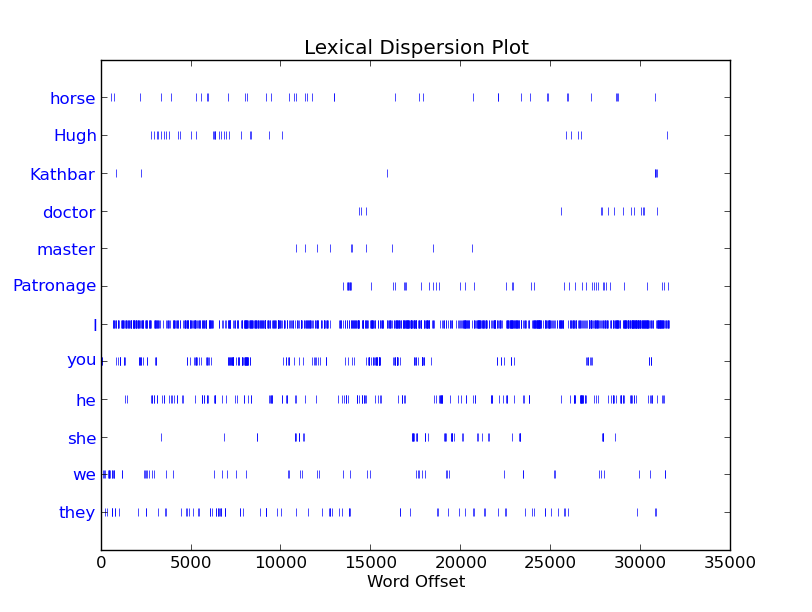The Horse's Tale
Editions
Infos
| Author | Anna Kavan |
|---|---|
| Coverage | |
| Subjects |
The Horse's Tale est un texte épais dont l’indice de diversité lexicale pointe à 6.033783. Il comporte 158893 caractères et 32685 mots dont 5417 différents.
The Horse's Tale introduit un nombre restreint de protagonistes évoluant dans un environnement sans nom.
The Horse's Tale, publiée pour la première fois en 1949, est une œuvre signée Anna Kavan. Elle a été éditée à 1 reprises, la dernière édition datant de 1949.
The book, whose equine hero Kathbar takes his name from an acronymic amalgam of Kavan and Karl Theodore Bluth, is a highly personal dream allegory. Kathbar is a circus horse and, at the end of the war, all circus horses are to be sent to the slaughterhouse. However, Kathbar, is an exceptional horse who can sing and recite poetry. He runs away from his owner (significantly named Hugh), to become a celebrity in an artist's colony by founding a school of 'Hoofism'. When Kathbar learns that Hoofism is finished, he falls into depression. Yet, depression is never far from the surface of Kathbar's life. 'Life can't exist without the pull of annihilation.' He comments at one point. Again: 'It's amazing how people who refuse to accept death existentially are the very ones most apt to disseminate it in a factual way. You open up your arms to death and create a living process out of the pull of nothing. These others don't create anything, they simply kill.' At a party held for him Kathbar becomes obstreperous and drunk, passes out and wakes up in an asylum, uncertain as to whether he is a man or a horse. 'I got the impression that it was not the hospital which existing for the benefit of the patients, but the patients whose function it was to provide the staff with an excuse for drawing their salaries. … It was a rule of the asylum to accede to every request made by an inmate, then simply ignore it.' A 'Mr. Patronage', a friend from the past, sends Kathbar to a 'mountain clinic', where a Dr Hieronymus tells him that his depression is due to the constitutional abnormality and that he is 'too gifted to lead the life of a horse'. Hieronymus, an alter-ego of Bluth, explains his 'existential psychology', Kathbar recovers his memory and sanity and returns to the circus. From "The Case of Anna Kavan", biography by David Callard, 1992). BY DAVID CALLARD:
Bigrams
Dispersion
Places

Characters

stats#bigram
- art master
- electric shock
- early morning
- death instinct
- Good heavens
- Kluge Hans
- single fly
- human beings
- Accent Adjutant
- university accent
- art school
- Arab horse
- slaughter house
- nudist colony
- clenched fist
- young man
- anyone else
- clay pictures
- long time
- Farmer Hugh
stats#has character
- Kathbar
- Dr Hieronymus
- Mr Patronage
- Hugh
stats#has character count
- 158893
stats#has diversity indice
- 6.033783
stats#has unique word count
- 5417
stats#has word count
- 32685
coverage
- asylum
- 20th century
creator
- http://openlibrary.org/authors/OL200810A
description
- The book, whose equine hero Kathbar takes his name from an acronymic amalgam of Kavan and Karl Theodore Bluth, is a highly personal dream allegory. Kathbar is a circus horse and, at the end of the war, all circus horses are to be sent to the slaughterhouse. However, Kathbar, is an exceptional horse who can sing and recite poetry. He runs away from his owner (significantly named Hugh), to become a celebrity in an artist's colony by founding a school of 'Hoofism'. When Kathbar learns that Hoofism is finished, he falls into depression. Yet, depression is never far from the surface of Kathbar's life. 'Life can't exist without the pull of annihilation.' He comments at one point. Again: 'It's amazing how people who refuse to accept death existentially are the very ones most apt to disseminate it in a factual way. You open up your arms to death and create a living process out of the pull of nothing. These others don't create anything, they simply kill.' At a party held for him Kathbar becomes obstreperous and drunk, passes out and wakes up in an asylum, uncertain as to whether he is a man or a horse. 'I got the impression that it was not the hospital which existing for the benefit of the patients, but the patients whose function it was to provide the staff with an excuse for drawing their salaries. … It was a rule of the asylum to accede to every request made by an inmate, then simply ignore it.' A 'Mr. Patronage', a friend from the past, sends Kathbar to a 'mountain clinic', where a Dr Hieronymus tells him that his depression is due to the constitutional abnormality and that he is 'too gifted to lead the life of a horse'. Hieronymus, an alter-ego of Bluth, explains his 'existential psychology', Kathbar recovers his memory and sanity and returns to the circus. From "The Case of Anna Kavan", biography by David Callard, 1992). BY DAVID CALLARD:
subject
- Existential psychology
title
- The Horse's Tale
22-rdf-syntax-ns#type
- http://purl.org/vocab/frbr/core#Work
work manifested
-
